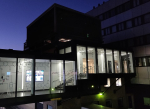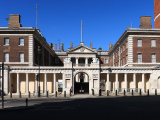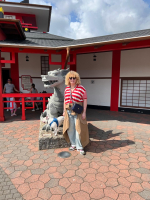
Whenever London's South Americans go looking for a job, a helping hand, the flavours of home or a party with their compatriots, they head to the Latino indoor market
in Seven Sisters.
But looming redevelopment projects have raised fears that this and other cherished enclaves could be destroyed.
"When I arrived here, I went directly to Seven Sisters, because I did not know any English, I wanted work and I needed help," said Colombian Ana Castro, 38, who has lived in London for a decade.
The market, located in a working-class neighbourhood in northeast London, is known as Pueblito Paisa, or Latin Village.
Here, Latinos seek out empanada pasties and arepas to snack on before having a haircut and sending remittance money back home.
But above all, it is the place to go for newcomers seeking guidance through Britain's bureaucratic hurdles -- or simply an English speaker to accompany them to the doctors' surgery.
Many of the market stalls are without running water, so the traders, mostly Colombians, have to fill up buckets in the local cafes, where the menus are chalked in Spanish.
- New tower -
A series of regeneration proposals, from 2007 onwards, have been blocked.
However, the community hub is now facing demolition, with the land being sold and the market set to be replaced with 196 homes on top of more than 3,500 square metres (38,000 square feet) of commercial space.
A group of traders and locals, led by Colombian Victoria Alvarez, has filed papers to England's High Court claiming that the "community character of the market is going to be destroyed", she told AFP.
The developer is offering to temporarily relocate all the stalls to a new tower it has built across the road.
The plan is to build "a sustainable new long-term market, deliver new homes and business space," said Joseph Ejiofor, leader of the Haringey Council local authority.
"When the market moves back to the site, returning traders have a clear list of commitments, including reduced rent and the guarantee of equivalent space."
However, Alvarez fears the rents will rocket once the South American enclave is surrounded by "luxury and franchise places".
"Under the name of regeneration, what there is is gentrification," the 48-year-old said.
- 'Manhattan' plan -
Santiago Peluffo fears the same will happen to the Elephant and Castle shopping centre in south London, which has a South American community of its own with some 150 Latino businesses in close proximity.
"The property developers point to a business model of big brands," said the Argentine, from the Latin Elephant association.
It has spent five years defending the shopping centre, where many Latin Americans come to watch football matches, peruse the job adverts or find rooms to rent.
Under railway viaduct arches, its restaurants put on regular salsa classes, and rumba on a weekend, when the party spirit infuses the surrounding streets.
But the area, two kilometres (1.2 miles) from the city centre, is being transformed, with its brutalist 1970s housing estates having been demolished and replaced by swanky new apartment blocks.
In January, the local authority finally approved plans to demolish the rundown 1960s shopping centre and build five or six 40-storey towers containing 979 flats, shops and a cinema.
"They show you the plans and it looks like Manhattan -- pure skyscrapers," said Peluffo.
The project is being held up by legal moves brought by a group of neighbours, who object to what they see as too little social housing -- 116 homes out of the total 979 planned units -- being included.
- 'Cultural diversity' -
Castro, who runs a clothes store in Elephant and Castle, is one of the few shopkeepers who obtained the right after presenting a business plan to return to the new complex once the redevelopment is completed, paying initially 40 percent and then 75 percent of the new market rental value.
Even so, she is unsure whether her small business can meet the rent and laments that the South American identity will be lost.
"This is the pity," she said, despite the Southwark local authority insisting they are committed to upholding the "incredible cultural diversity" of the area.
"We have previously pledged to support a Latin quarter in the area," said Johnson Situ, Southwark Council's cabinet member for growth, development and planning.
Back in Haringey, Alvarez, who fled the conflict in Colombia 30 years ago, said: "As a refugee, sometimes you feel you have no rights.
"This is a psychological complex that the community we created here has helped me to overcome."
She said that she was willing to take the case to the European courts if necessary. afp









































